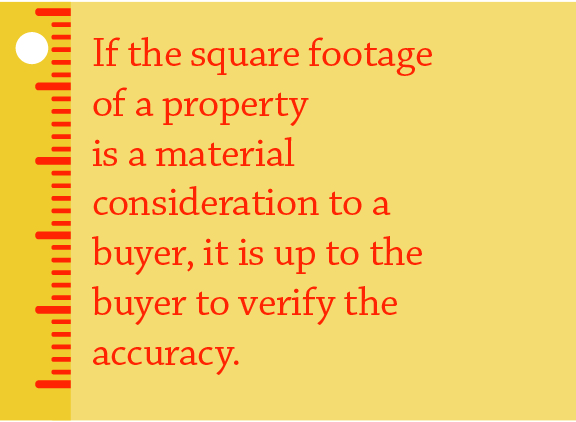Legal Talk: For Good Measure
By: Will Martin | General Counsel
Minerals in place underneath the surface of the earth, including oil and gas, can be owned separately from the surface of the property. So what does that mean to buyers and sellers?
 Square Footage
Square Footage
Most properties are listed in a multiple listing service (MLS), and most MLSs in North Carolina require a property’s square footage to be reported. When square footage is reported, it is important for the seller and listing agent to take the necessary steps to ensure that the reported value is reasonably accurate. Remember, some sources of square footage information may not be as reliable, for instance the square footage determined by the property owner, included in property tax records or in a listing, appraisal report or survey prepared in connection with an earlier transaction. Agents may only report square footage that meets the “Living Area Criteria” as set forth in the NC Real Estate Commission’s Residential Square Footage Guidelines, available in the “Publications” section of the Commission’s website.
If the square footage of a property is a material consideration to a buyer, it is up to the buyer to verify the accuracy of the reported square footage. Because real estate agents are expected to be able to accurately calculate the square footage of most dwellings, the buyer’s agent may assist in measuring the property and calculating its square footage.
However, an agent may engage another professional such as a state-licensed or state-certified appraiser to assist, especially if the structure is of an unusual or complex design.
Because all properties are unique, minor discrepancies in calculating square footage are not considered to constitute negligence on the part of the agent by the Real Estate Commission. Slight variations in tape readings and small differences in rounding off or conversion from inches to decimals, when multiplied over distances, will cause reasonable discrepancies between two competent measurements of the same dwelling. In addition, discrepancies between measurements may also be attributable to reasonable differences in interpretation.
Acreage
Sellers and their agents must also take care in making representations about the acreage of property being listed for sale. If property boundaries are at all in doubt, a seller should consider having the property surveyed prior to putting it up for sale.
A buyer should give serious consideration to obtaining a new survey of the property from a North Carolina registered surveyor, to avoid unnecessary complications. A survey will normally reveal such things as encroachments on the property from adjacent properties (fences, driveways, etc.); encroachments onto adjacent properties; road or utility easements crossing the property; violations of set-back lines; lack of legal access to a public right-of-way; and indefinite or erroneous legal descriptions in previous deeds to the property.
Although title insurance companies may provide lender coverage without a new survey, the owner’s policy contains an exception for easements, set-backs and other matters which would have been shown on a survey. Many such matters are not public record and would not be included in an attorney’s title examination. In addition, if you do not obtain your own survey, you would have no claim against a surveyor for inaccuracies in a prior survey.
While real estate agents are not trained, and do not have the expertise to measure or calculate a property’s acreage, they may be able to help a seller or buyer identify a North Carolina registered surveyor, who must be licensed by the NC Board of Examiners for Engineers and Surveyors. The license status of a surveyor can be checked on the Board’s website under “License Lookup.”
If the standard Offer to Purchase and Contract is used, the buyer should have any square footage calculation and/or survey completed during the Due Diligence Period.
Q&A: Always think carefully about the square footage being reported
Advice from the NC REALTORS® Legal Hotline
QUESTION: Do buyer agents have a duty to verify square footage information?
ANSWER: We have written previously about the responsibilities of listing agents to provide accurate information if they choose to report the square footage of their listings in their advertising. But buyer agents have responsibilities as well. The Real Estate Commission has published Residential Square Footage Guidelines which can be viewed on the Commission’s website under the “Publications” tab. On page 6 of that publication, the Commission writes as follows: “Generally speaking, an agent working with a buyer (either as a buyer’s agent or as a seller’s agent) may rely on the listing agent’s square footage representations except in those unusual instances when there is an error in the reported square footage that should be obvious to a reasonably prudent agent. For example, a buyer’s agent would not be expected to notice that a house advertised as containing 2,200 square feet of living area in fact contained only 2000 square feet. On the other hand, that same agent, under most circumstances, would be expected to realize that a house described as containing 3,200 square feet really contained only 2,300 square feet of living area. If there is such a “red flag” regarding the reported square footage, the agent working with the buyer should promptly point out the suspected error to the buyer and the listing agent. The listing agent should then verify the square footage and correct any error in the information reported.” Based on the Commission’s own guidance, your failure to notice an 80 square foot discrepancy in a condo listed as having 900 square feet does not mean that you would definitely receive discipline by the Commission. However, that does not mean that your buyer client might not file a lawsuit in an attempt to hold you and your firm responsible for damages. The best suggestion we can give to buyer agents: always think carefully about the square footage being reported. When in doubt, tell your client… and ask for verification.
The information in this article has been taken from the Buyer and Seller Advisories, which are available to NC REALTORS® online at ncrealtors.org.
NC REALTORS® provides articles on legal topics as a member service. They are general statements of applicable legal and ethical principles for member education only. They do not constitute legal advice. The services of a private attorney should be sought for legal advice.
© Copyright 2017. North Carolina Association of REALTORS®, Inc. This article is intended solely for the benefit of NC REALTORS® members, who may reproduce and distribute it to other NC REALTORS® members and their clients, provided it is reproduced in its entirety without any change to its format or content, including disclaimer and copyright notice, and provided that any such reproduction is not intended for monetary gain. Any unauthorized reproduction, use or distribution is prohibited.

